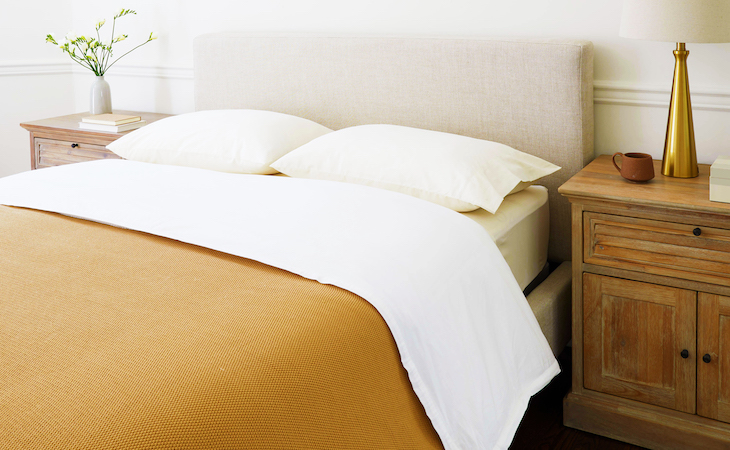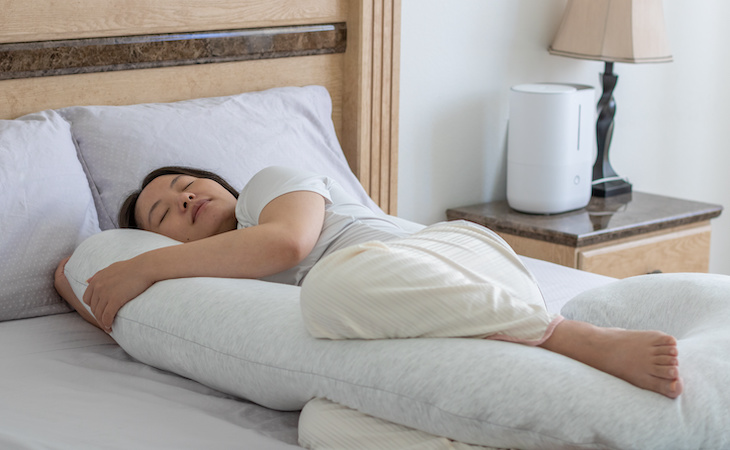My husband has been kicked out of bed more than a few times in our marriage for snoring. He’s not alone as roughly 60% of men and 40% of women snore. Now that we’re in the market for a snoring solution, I decided to use my research skills to find out if anti-snoring pillows are the real deal.
I spoke with Jeffery Durmer, MD, PhD, a neurologist and board-certified sleep medicine physician, and it turns out that snoring—and anti-snoring pillows—is a lot more complex an issue than I thought.
Read on to find out how anti-snoring pillows work, what to look for in one, and other methods you can try to reduce snoring.
What is an anti-snoring pillow?
Anti-snoring pillows come in different sizes, shapes, and materials. Some are meant to elevate your head and some look like a regular pillow, but they’re all meant to provide support to your head and neck during sleep.
Some pillows are specifically made to be used when wearing a CPAP (continuous positive airway pressure) machine if you have sleep apnea.
These pillows are designed to keep your chin further from your neck to open up your airway. Ideally, the pillow needs to be higher toward you and taper away, in order to support your neck more than your head, explains Durmer, as your head doesn’t need as much support as your neck.
Do anti-snoring pillows work?
To find out how anti-snoring pillows work, Durmer says we need to understand why we snore in the first place. Because our necks are flexible and tend to be a weak spot in our upper body when lying down flat at night, it’s common to get kinked.
“Everybody has this kink that causes the airway to suck itself closed,” explains Durmer. Therefore, pillows are an invention that repositions this airway so we can breathe—and it’s backed by science.
Whether you have a high-end anti-snoring pillow, or you use soft moldable pillows that can support this alignment to keep the airway open, you can reduce snoring.
What’s the best pillow to help stop snoring?
The best anti-snoring pillow is going to be different for everyone. There are several different anti-snoring pillows that vary according to shape and type of materials, including:
- Memory foam: Memory foam allows your head to sink into the pillow while supporting your neck. These pillows tend to keep their shape and can be used whether you sleep on your side or back.
- Wedge: Wedge pillows are shaped like a triangle with the highest point above your head and inclining down toward your back. They’re usually made of foam and allow you to have your upper body elevated. This can keep the airway open and decrease sinus pressure.
- Adjustable: These pillows can be unzipped and the filling removed as much as you want. Durmer advises not to remove too much filling or use a pillow that’s floppy because it won’t give you the correct support.
- Down: Down pillows tend to feel plush and are a lot more moldable than other firmer pillows. These may not be the best option, however, if you have allergies since they contain feathers.
Other ways to prevent snoring
Besides finding a supportive pillow, there are a few other tips to get the best night’s sleep, including:
- Sleeping on your side. Sleeping on your side, even if it’s just slightly, can improve breathing and sleep quality.
- Avoid alcohol as it can cause snoring.
- Raising the head of the bed by propping the bed legs up on risers so the entire bed is inclined slightly.
- Treat a stuffy nose with saline nasal spray, steam, or nasal strips.
- Get tested for sleep apnea, a condition where your breathing pauses throughout the night, causing snoring, dry mouth, and daytime sleepiness.
FAQs
Who could benefit from using an anti-snoring pillow?
If you snore, then look for a pillow that can better support your airway at night. This might be an anti-snoring pillow, but even sleeping on your side with a pillow that can support your head and neck to keep your airway open can greatly reduce snoring.
Can an anti-snoring pillow be used with other snoring reduction devices or methods?
You might already use a CPAP machine for sleep apnea or use an oral device. Durmer says sleeping on your side or using nasal saline before bed can help with comfort and further reduce snoring. You can also sleep on your side with an anti-snoring pillow or try raising the head of the bed.
Are there any anti-snoring devices that actually work?
Even if you have sleep apnea, you don’t necessarily need a CPAP machine, according to Durmer. Using a supportive pillow and sleeping on your side can be enough to reduce snoring. Oral devices can help hold your lower jaw or tongue forward so there isn’t added pressure on the airway. You can get these over the counter, but it’s a good idea to talk with your healthcare provider first.
For advice on choosing the right pillow for various conditions, check out our guide to the best pillows for common health concerns.




